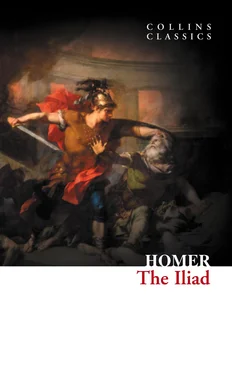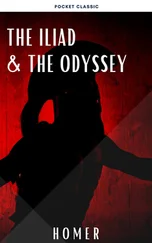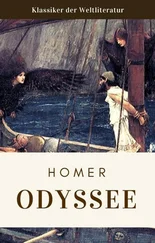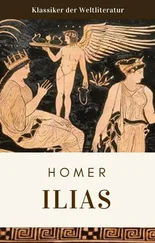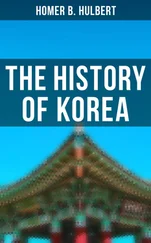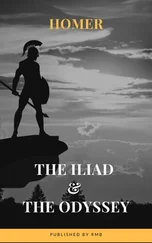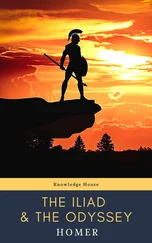But left Eurymedon the reins to guide;
The fiery coursers snorted at his side.
On foot through all the martial ranks he moves
And these encourages, and those reproves.
“Brave men!” he cries, (to such who boldly dare
Urge their swift steeds to face the coming war),
“Your ancient valour on the foes approve;
Jove is with Greece, and let us trust in Jove.
’Tis not for us, but guilty Troy, to dread,
Whose crimes sit heavy on her perjured head;
Her sons and matrons Greece shall lead in chains,
And her dead warriors strew the mournful plains.”
Thus with new ardour he the brave inspires;
Or thus the fearful with reproaches fires:
“Shame to your country, scandal of your kind;
Born to the fate ye well deserve to find!
Why stand ye gazing round the dreadful plain,
Prepared for flight, but doom’d to fly in vain?
Confused and panting thus, the hunted deer
Falls as he flies, a victim to his fear.
Still must ye wait the foes, and still retire,
Till yon tall vessels blaze with Trojan fire?
Or trust ye, Jove a valiant foe shall chase,
To save a trembling, heartless, dastard race?”
This said, he stalk’d with ample strides along,
To Crete’s brave monarch and his martial throng;
High at their head he saw the chief appear,
And bold Meriones excite the rear.
At this the king his generous joy express’d,
And clasp’d the warrior to his armed breast.
“Divine Idomeneus! what thanks we owe
To worth like thine! what praise shall we bestow?
To thee the foremost honours are decreed,
First in the fight and every graceful deed.
For this, in banquets, when the generous bowls
Restore our blood, and raise the warriors’ souls,
Though all the rest with stated rules we bound,
Unmix’d, unmeasured, are thy goblets crown’d.
Be still thyself, in arms a mighty name;
Maintain thy honours, and enlarge thy fame.”
To whom the Cretan thus his speech address’d:
“Secure of me, O king! exhort the rest.
Fix’d to thy side, in every toil I share,
Thy firm associate in the day of war.
But let the signal be this moment given;
To mix in fight is all I ask of Heaven.
The field shall prove how perjuries succeed,
And chains or death avenge the impious deed.”
Charm’d with this heat, the king his course pursues,
And next the troops of either Ajax views:
In one firm orb the bands were ranged around,
A cloud of heroes blacken’d all the ground.
Thus from the lofty promontory’s brow
A swain surveys the gathering storm below;
Slow from the main the heavy vapours rise,
Spread in dim streams, and sail along the skies,
Till black as night the swelling tempest shows,
The cloud condensing as the west-wind blows:
He dreads the impending storm, and drives his flock
To the close covert of an arching rock.
Such, and so thick, the embattled squadrons stood,
With spears erect, a moving iron wood:
A shady light was shot from glimmering shields,
And their brown arms obscured the dusky fields.
“O heroes! worthy such a dauntless train,
Whose godlike virtue we but urge in vain,
(Exclaim’d the king), who raise your eager bands
With great examples, more than loud commands.
Ah! would the gods but breathe in all the rest
Such souls as burn in your exalted breast,
Soon should our arms with just success be crown’d,
And Troy’s proud walls lie smoking on the ground.”
Then to the next the general bends his course;
(His heart exults, and glories in his force);
There reverend Nestor ranks his Pylian bands,
And with inspiring eloquence commands;
With strictest order sets his train in arms,
The chiefs advises, and the soldiers warms.
Alastor, Chromius, Haemon, round him wait,
Bias the good, and Pelagon the great.
The horse and chariots to the front assign’d,
The foot (the strength of war) he ranged behind;
The middle space suspected troops supply,
Inclosed by both, nor left the power to fly;
He gives command to “curb the fiery steed,
Nor cause confusion, nor the ranks exceed:
Before the rest let none too rashly ride;
No strength nor skill, but just in time, be tried:
The charge once made, no warrior turn the rein,
But fight, or fall; a firm embodied train.
He whom the fortune of the field shall cast
From forth his chariot, mount the next in haste;
Nor seek unpractised to direct the car,
Content with javelins to provoke the war.
Our great forefathers held this prudent course,
Thus ruled their ardour, thus preserved their force;
By laws like these immortal conquests made,
And earth’s proud tyrants low in ashes laid.”
So spoke the master of the martial art,
And touch’d with transport great Atrides’ heart.
“Oh! hadst thou strength to match thy brave desires,
And nerves to second what thy soul inspires!
But wasting years, that wither human race,
Exhaust thy spirits, and thy arms unbrace.
What once thou wert, oh ever mightst thou be!
And age the lot of any chief but thee.”
Thus to the experienced prince Atrides cried;
He shook his hoary locks, and thus replied:
“Well might I wish, could mortal wish renew
That strength which once in boiling youth I knew;
Such as I was, when Ereuthalion, slain
Beneath this arm, fell prostrate on the plain.
But heaven its gifts not all at once bestows,
These years with wisdom crowns, with action those:
The field of combat fits the young and bold,
The solemn council best becomes the old:
To you the glorious conflict I resign,
Let sage advice, the palm of age, be mine.”
He said. With joy the monarch march’d before,
And found Menestheus on the dusty shore,
With whom the firm Athenian phalanx stands;
And next Ulysses, with his subject bands.
Remote their forces lay, nor knew so far
The peace infringed, nor heard the sounds of war;
The tumult late begun, they stood intent
To watch the motion, dubious of the event.
The king, who saw their squadrons yet unmoved,
With hasty ardour thus the chiefs reproved:
“Can Peleus’ son forget a warrior’s part.
And fears Ulysses, skill’d in every art?
Why stand you distant, and the rest expect
To mix in combat which yourselves neglect?
From you ’twas hoped among the first to dare
The shock of armies, and commence the war;
For this your names are call’d before the rest,
To share the pleasures of the genial feast:
And can you, chiefs! without a blush survey
Whole troops before you labouring in the fray?
Say, is it thus those honours you requite?
The first in banquets, but the last in fight.”
Ulysses heard: the hero’s warmth o’erspread
His cheek with blushes: and severe, he said:
“Take back the unjust reproach! Behold we stand
Sheathed in bright arms, and but expect command.
If glorious deeds afford thy soul delight,
Behold me plunging in the thickest fight.
Then give thy warrior-chief a warrior’s due,
Who dares to act whate’er thou dar’st to view.”
Struck with his generous wrath, the king replies:
“O great in action, and in council wise!
With ours, thy care and ardour are the same,
Nor need I to commend, nor aught to blame.
Sage as thou art, and learn’d in human kind,
Forgive the transport of a martial mind.
Haste to the fight, secure of just amends;
The gods that make, shall keep the worthy, friends.”
Читать дальше
